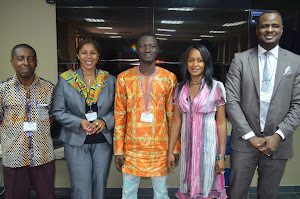FROM EMUND SMITH-ASANTE, DAKAR
 |
| A pump machine at a water retention pond in the Djeddah community |
Last year alone,
11 deaths were recorded as a result of the collapsing of some houses during the
floods, while a host of people were plagued with water borne and skin diseases,
as well as malaria.
Apart from
resettling communities, the amount has been mainly used for pump machines, big
tubes and the creation of dams to store the flood waters and drain into the sea
through the use of fire tenders of the country’s Fire Service, under the
rainwater management and adaptation to climate change project.
These came to
light, when about 28 journalists from 13 countries in the West Africa
sub-region belonging to the regional network of water and sanitation
journalists – WASH-JN, on Tuesday, April 9, 2013, undertook a trip to the
Djeddah Tharoye Kao municipality in Dakar which has a population of 157,000.
Addressing the
journalists in his office, the Municipal Chief Executive, Aliou Diouck, said Senegal
has been inundated by floods since 1989 after a 20-year-long period of drought
and already, 350,000 Dakar residents have been impacted by the floods.
He further
intimated that as a result of the floods, communities have been displaced,
while the water table of the municipality, which is made up of 66 districts,
out of which only six are planned, is polluted.
This pollution
of the water table was corroborated by Penda Sarr, an official at the
municipality’s office, who led the journalists to a slum in the Pekine area,
Djeddah, which has been overtaken by the floods.
She indicated
that as a result of the pollution of the water table, which increases by one
metre every year, a borehole that provided water for the slum had to be closed,
since the water was not fit for human consumption.
But according to
17-year-old Comba Sarr who has lived in the community for 10 years, the lack of
water is not their only worry.
“We buy garbage
to the tune of CFA 20,000 when the floods come so we can stop the flood waters
from reaching our residence. We have a very difficult situation when it floods
from June to August,” she said.
 |
| Senya Bou Ngom |
She affirmed
that although they were relocated under temporal shelters of canopies in 2005,
they stayed during the floods in 2012.
Senya Bou Ngom,
a mother of one, disclosed further that during the floods, water from four
standpipes in the community turned reddish, but quickly added that the local
government authority gave them some chlorine tablets to purify the water for
use, as well as mosquito nets, medicines and receptacles to store water.
Addressing the
concerns raised during the tour by the journalists later in his office, the
Mayor, Aliou Diouck, said much of the problems had arisen because people have
settled illegally in places which have now become slums.
Stating that in
the 1960s and 1970s many rural dwellers moved to the capital cities, thus
giving rise to slums, he said, “120,000 people migrate to Dakar every year and
settle in the Pekine area. In the beginning government tried its best but
people built at night. People said they were land owners and gave them so
called land titles to build.”
Disclosing that
for four to five years the population in the area has increased, he stated: “We
are obliged to provide them assistance because they are all citizens. Even
though they settled illegally, we are obliged to defend their rights.”
 |
| The Mayor, Aliou Diouck |
Proffering an
answer to the question of why people will not leave the slum though it is a
flood prone area, Aliou Diouck said: “It is difficult for people to leave the
flooded areas because they are attached to the areas and will not like to leave
friends or part of their livelihood.”
Earlier on in a
briefing, Ibrahim Sane, a technical officer at the Municipal office told the
West African journalists that in order to do effective flood control, the area
had been zoned into three areas – A, B and C for a six-month field study.
Explaining that
a proper data base is needed to enable effective flood control, he said the
study will involve 6,000 houses in 445 settlements and 75,000 people.
Also adding her
voice and giving an overview of the Djeddah slum area, Ms. Penda Sarr disclosed
that as part of the study, 218 people took part in a workshop, while out of the
29,000 children in the community, only 12,000 are attending school because
parents do not have the means to send their wards to school.
Meanwhile during
the visit to the Djeddah slum, it was noticed that almost the entire area had
recently been inundated by the floods, with garbage strewn all around. This was
very evident from a lot of deserted and destroyed houses that still had the
flood waters in them.
 |
| A house inundated by the floods |
It was also evident
as the Mayor disclosed; that some dwellers were determined to continue living
in the place despite the floods – some construction was still ongoing despite
the wide destruction of property that could be seen all around, and in one
instance the builders had raised the foundation so high in an attempt to escape
the flood waters when they come again.





No comments:
Post a Comment